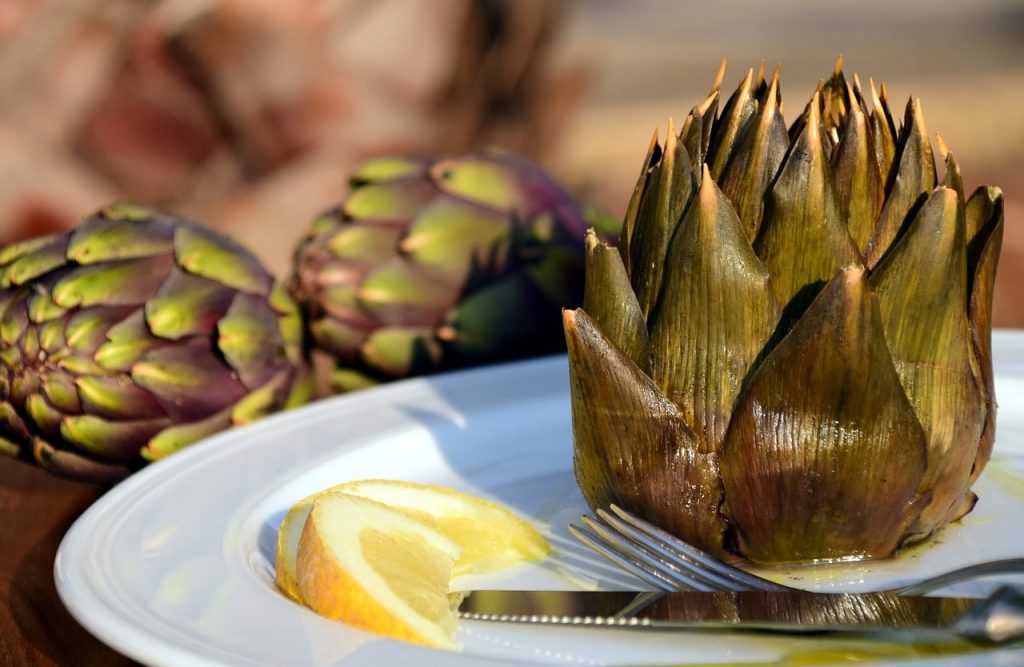
Artichokes are a superfood, packed full of disease-fighting antioxidants, fiber, folate, vitamins and minerals. But are they safe to eat with gout? It turns out they’re not just safe, they may even help with your gout. Read on to discover how.
Artichokes and Gout
Gout is a very painful form of inflammatory arthritis caused by high levels of uric acid in the blood out of which needle-shaped crystals of monosodium urate can settle in the joints and surrounding tissue.
Uric acid is a byproduct of purine metabolism. Purines are natural chemical compounds that exist in our bodies and the food we eat, so people with gout have to be careful with their diet: some foods are safe, some have to be consumed in moderation, and some completely avoided.
So are artichokes safe to consume as part of a healthy gout diet?
The artichoke is a variety of thistle which has been cultivated as a food since ancient Greek and Roman times. Today, artichoke is a staple of the Mediterranean Diet which came top of the expert-reviewed “Best Diets 2021” published by U.S. News.
Artichokes are a versatile vegetable: they can be steamed, boiled, braised, grilled, or baked, and used in appetizers and main dishes.
Artichoke Health Benefits
Artichokes are a very rich source of fiber, folate, vitamin K, and a good source of vitamin C, magnesium, manganese, sodium, potassium, and phosphorus. They also have decent amounts of niacin, riboflavin, and vitamin B6, as well as omega-3 and omega-6.
Artichokes also contain powerful antioxidants, such as cynarin, rutin, quercetin, silymarin, luteolin, and gallic acid. Antioxidants help combat free radicals in the body that have been linked to chronic diseases, like cardiovascular disease, diabetes, Alzheimer’s, inflammatory and autoimmune disorders, degenerative diseases, and cancer.
Although much more research is needed, some studies indicate that artichokes may help to:
- lower blood sugar
- regulate blood pressure
- improve gut health
- reduce cholesterol
- maintain liver health
- ease IBS symptoms
- boost the immune system
- suppress inflammation
So artichokes are a highly nutritious food with potentially numerous health benefits.
But what if you suffer with gout? Can they raise the risk of a gout flare-up?
Are Artichokes Safe to Eat with Gout?
Artichokes are safe to eat with gout since they are low in purines and have very little fructose (fructose has been linked to high uric acid too).
But they may also help your gout…
- Research shows that a high-fiber diet may help to inhibit inflammation caused by monosodium urate crystals and, of course, artichokes are a very rich source of dietary fiber.
- One study shows a positive association between low Glycemic Index (GI) and low uric acid. Artichokes have a low GI of just 20 (under 55 is considered low).
- Uric acid is produced in the liver, so an unhealthy liver could raise your risk of gout. Artichokes are thought to support a healthy liver and may help to reduce that risk.
- Artichokes are a natural diuretic that can aid uric acid excretion through increased urine flow.
Not only are artichokes safe to eat with gout, they may actually help to reduce your risk of gout flare-ups. So you can safely add artichokes into your gout diet.



